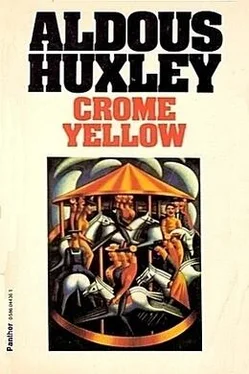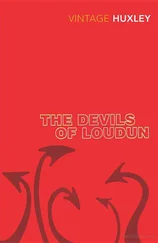"At this very moment," he went on, "the most frightful horrors are taking place in every corner of the world. People are being crushed, slashed, disembowelled, mangled; their dead bodies rot and their eyes decay with the rest. Screams of pain and fear go pulsing through the air at the rate of eleven hundred feet per second. After travelling for three seconds they are perfectly inaudible. These are distressing facts; but do we enjoy life any the less because of them? Most certainly we do not. We feel sympathy, no doubt; we represent to ourselves imaginatively the sufferings of nations and individuals and we deplore them. But, after all, what are sympathy and imagination? Precious little, unless the person for whom we feel sympathy happens to be closely involved in our affections; and even then they don't go very far. And a good thing too; for if one had an imagination vivid enough and a sympathy sufficiently sensitive really to comprehend and to feel the sufferings of other people, one would never have a moment's peace of mind. A really sympathetic race would not so much as know the meaning of happiness. But luckily, as I've already said, we aren't a sympathetic race. At the beginning of the war I used to think I really suffered, through imagination and sympathy, with those who physically suffered. But after a month or two I had to admit that, honestly, I didn't. And yet I think I have a more vivid imagination than most. One is always alone in suffering; the fact is depressing when one happens to be the sufferer, but it makes pleasure possible for the rest of the world."
There was a pause. Henry Wimbush pushed back his chair.
"I think perhaps we ought to go and join the ladies," he said.
"So do I," said Ivor, jumping up with alacrity. He turned to Mr. Scogan. "Fortunately," he said, "we can share our pleasures. We are not always condemned to be happy alone."
Ivor brought his hands down with a bang on to the final chord of his rhapsody. There was just a hint in that triumphant harmony that the seventh had been struck along with the octave by the thumb of the left hand; but the general effect of splendid noise emerged clearly enough. Small details matter little so long as the general effect is good. And, besides, that hint of the seventh was decidedly modern. He turned round in his seat and tossed the hair back out of his eyes.
"There," he said. "That's the best I can do for you, I'm afraid."
Murmurs of applause and gratitude were heard, and Mary, her large china eyes fixed on the performer, cried out aloud, "Wonderful!" and gasped for new breath as though she were suffocating.
Nature and fortune had vied with one another in heaping on Ivor Lombard all their choicest gifts. He had wealth and he was perfectly independent. He was good looking, possessed an irresistible charm of manner, and was the hero of more amorous successes than he could well remember. His accomplishments were extraordinary for their number and variety. He had a beautiful untrained tenor voice; he could improvise, with a startling brilliance, rapidly and loudly, on the piano. He was a good amateur medium and telepathist, and had a considerable first–hand knowledge of the next world. He could write rhymed verses with an extraordinary rapidity. For painting symbolical pictures he had a dashing style, and if the drawing was sometimes a little weak, the colour was always pyrotechnical. He excelled in amateur theatricals and, when occasion offered, he could cook with genius. He resembled Shakespeare in knowing little Latin and less Greek. For a mind like his, education seemed supererogatory. Training would only have destroyed his natural aptitudes.
"Let's go out into the garden," Ivor suggested. "It's a wonderful night."
"Thank you," said Mr. Scogan, "but I for one prefer these still more wonderful arm–chairs." His pipe had begun to bubble oozily every time he pulled at it. He was perfectly happy.
Henry Wimbush was also happy. He looked for a moment over his pince–nez in Ivor's direction and then, without saying anything, returned to the grimy little sixteenth–century account books which were now his favourite reading. He knew more about Sir Ferdinando's household expenses than about his own.
The outdoor party, enrolled under Ivor's banner, consisted of Anne, Mary, Denis, and, rather unexpectedly, Jenny. Outside it was warm and dark; there was no moon. They walked up and down the terrace, and Ivor sang a Neapolitan song: "Stretti, stretti"—close, close—with something about the little Spanish girl to follow. The atmosphere began to palpitate. Ivor put his arm round Anne's waist, dropped his head sideways onto her shoulder, and in that position walked on, singing as he walked. It seemed the easiest, the most natural, thing in the world. Denis wondered why he had never done it. He hated Ivor.
"Let's go down to the pool," said Ivor. He disengaged his embrace and turned round to shepherd his little flock. They made their way along the side of the house to the entrance of the yew–tree walk that led down to the lower garden. Between the blank precipitous wall of the house and the tall yew trees the path was a chasm of impenetrable gloom. Somewhere there were steps down to the right, a gap in the yew hedge. Denis, who headed the party, groped his way cautiously; in this darkness, one had an irrational fear of yawning precipices, of horrible spiked obstructions. Suddenly from behind him he heard a shrill, startled, "Oh!" and then a sharp, dry concussion that might have been the sound of a slap. After that, Jenny's voice was heard pronouncing, "I am going back to the house." Her tone was decided, and even as she pronounced the words she was melting away into the darkness. The incident, whatever it had been, was closed. Denis resumed his forward groping. From somewhere behind Ivor began to sing again, softly:
"Phillis plus avare que tendre Ne gagnant rien a refuser, Un jour exigea a Silvandre Trente moutons pour un baiser."
The melody drooped and climbed again with a kind of easy languor; the warm darkness seemed to pulse like blood about them.
"Le lendemain, nouvelle affaire: Pour le berger le troc fut bon…"
"Here are the steps," cried Denis. He guided his companions over the danger, and in a moment they had the turf of the yew–tree walk under their feet. It was lighter here, or at least it was just perceptibly less dark; for the yew walk was wider than the path that had led them under the lea of the house. Looking up, they could see between the high black hedges a strip of sky and a few stars.
"Car il obtint de la bergere…"
Went on Ivor, and then interrupted himself to shout, "I'm going to run down," and he was off, full speed, down the invisible slope, singing unevenly as he went:
"Trente baisers pour un mouton."
The others followed. Denis shambled in the rear, vainly exhorting everyone to caution: the slope was steep, one might break one's neck. What was wrong with these people, he wondered? They had become like young kittens after a dose of cat–nip. He himself felt a certain kittenishness sporting within him; but it was, like all his emotions, rather a theoretical feeling; it did not overmasteringly seek to express itself in a practical demonstration of kittenishness.
"Be careful," he shouted once more, and hardly were the words out of his mouth when, thump! there was the sound of a heavy fall in front of him, followed by the long "F–f–f–f–f" of a breath indrawn with pain and afterwards by a very sincere, "Oo–ooh!" Denis was almost pleased; he had told them so, the idiots, and they wouldn't listen. He trotted down the slope towards the unseen sufferer.
Mary came down the hill like a runaway steam–engine. It was tremendously exciting, this blind rush through the dark; she felt she would never stop. But the ground grew level beneath her feet, her speed insensibly slackened, and suddenly she was caught by an extended arm and brought to an abrupt halt.
Читать дальше











